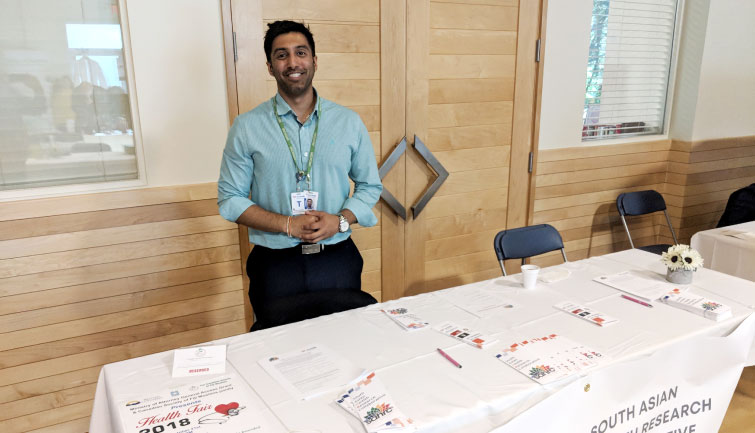
People of South Asian descent make up nearly 40 per cent of our Fraser South community, yet are historically underrepresented in health research.
Set to become the largest city in B.C. in the coming years, Surrey is home to the province's largest South Asian community, with the broader Fraser Health region further adding to the population. Research shows that people of South Asian descent are at a higher risk for diabetes and heart disease, but they have historically been underrepresented in health studies.
Dr. Sonia Singh, Fraser Health's program medical director for research from 2011 to 2019, helped address this research gap by establishing the South Asian Health Research Collaborative (SAHRC), which aims to identify health research priorities for the South Asian community in our region.
Dr. Nitasha Puri, staff physician, Addiction Medicine and Substance Use Services, is now leading the ongoing work that continues to build on a recent study that identified the South Asian community's research priorities.
"Many researchers shared their struggles with engaging the South Asian community in their studies," says Dr. Singh. "Out of these discussions came the idea of creating a research collaborative to better connect with the South Asian community. Surrey Hospitals Foundation was ready to help us drive this work forward by providing funding support."
"Surrey and its surrounding communities are home to a large and incredibly diverse population, making it ideal for health research," says Nicole Robson, president and chief executive officer, Surrey Hospitals Foundation. "Representation of underserved communities in research is essential because the findings will enhance care delivery, improve patient experience and ultimately shape the future of health care in our community, so we were excited to support this."
With the assistance of a steering committee comprised of health care providers, researchers from universities and health organizations, and South Asian community members with lived experience, SAHRC developed a study to identify research priorities.
As part of the study, an online questionnaire was developed to ask people to identify their top three health research questions and was shared with the community in English, Hindi and Punjabi. In partnership with over 15 community-based organizations, the questionnaire reached over 225 participants across 17 community events, including sessions at places of worship.
Members of the steering committee analyzed the questionnaires and then invited partner organizations and community members to participate in establishing the top health priorities for people of South Asian descent after the questionnaires were analyzed.
The study, Exploring the Health Research Priorities of the South Asian Community in British Columbia, published in April 2025, identified the following research priorities for the South Asian community:
- Identify and reduce barriers that prevent members of the South Asian community from accessing mental health services.
- Facilitate the uptake and use of diet-related information about diabetes within the South Asian community.
- Evaluate the effectiveness of complementary and alternative medicine therapies in managing illnesses and explore how they can be integrated with Western medicine.
"Many community members want to give back, and participation in research is one way to do that," says Aven Sidhu, quality improvement lead for Clinical Quality Improvement and Patient Safety, who originally joined Fraser Health as a research coordinator to support SARHC in 2018. "The turnout showed how much people cared, with 78 per cent of participants having no prior research experience."
Since completing the study, SAHRC has developed an online presence to foster connections among researchers and knowledge users. The team is also working to strengthen partnerships with community-based organizations through community practice calls, facilitating the exchange of best practices in recruiting South Asian participants. Future initiatives include a mentor/mentee program to cultivate expertise and promote capacity building in South Asian research.
